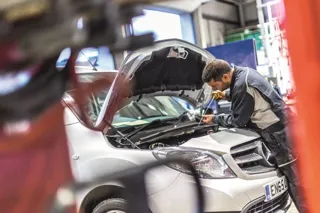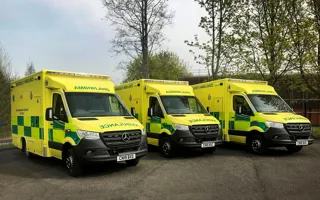In May and June, Fleet News surveyed all the major manufacturers to find out how they were responding to the coronavirus pandemic, how they are supporting their fleets customers and their views on the type of impact it would have on the fleet sector.
The resulting article was published in the June edition of Fleet News.
Here is Mercedes-Benz Vans' response.
Fleet News spoke to Steve Bridge, Mercedes-Benz Vans managing director (answers as at 5/6/20)
How are you and your team staying operational in times of Covid-19?
Operationally, we implemented an agile working culture shift and business digitalisation shift two years ago, which meant that when the lockdown happened, we were all full equipped and used to remote working, so we experienced no reduction in productivity.
We have practiced and understood principles of agile working, so it was and continues to be business as usual; the only challenge is the social side to work, which we have all missed and are looking to get back to some normality when we can get together.
What action are you taking to support fleets during the Covid-19 crisis?
In addition to conducting our usual regular strategic reviews and proactive customer contact via digital communication channels, we quickly identified essential user fleets and introduced a Critical Fleet Register for prioritised for workshop assistance.
We made end-of-contract vehicles available for customers to retain on fleet and priority of vehicle production and delivery was allocated for essential user fleets.
We also launched additional financial support for smaller fleets, as well as coordinating with our colleagues in Mercedes-Benz Finance to offer relief for anyone struggling.
Our business-as-usual approach also included our MobiloVan roadside assistance service and communicating updated dealer openings and capacity to the key fleets.
Will Covid-19 have a bigger and longer lasting impact on our industry than the financial crisis in 2008? Please explain your view.
We believe that the crisis in 2008 and the one in 2020 are very different. We see their basis, the segments impacted, and the ability to recover as two very different scenarios. As a result, we predict the depth and length of the impact to be different also.
The 2008 market regression was due to a wider economic landscape, the financial crisis, and the availability of funding (particularly impacting manufacturing and construction). We saw the fleet segments being hurt more as many operators delayed renewing their assets and big capital decisions.
The retail/smaller businesses were less impacted (cash and availability of manufacturer finance etc.). As a result, the market reduced by -15% in 2008 and a further -36% in 2009. It then took six years to recover to the 2007 levels.
In 2020 we foresee it hitting deeper, but with a much shorter recovery period. The 2020 UK van market could finish between -30% and -50% on 2019 levels.
The basis for the majority of this reduction is an artificial halting of the market due to lockdown. Therefore, the minority of this market reduction will be actually be based on the general economic impact/demand. We certainly see demand in construction and home delivery remaining healthy at least.
As a result, our thoughts are similar to the popular projections on the UK GDP in that the market impact will be deep, but relatively short.
How much of a decline in total market fleet sales are you forecasting this year?
We believe this could be around 20%, but it will vary depending on sector of course. Many customers are telling us that they’re now expecting to place orders whereas they had forecast a flat year, for example, due to unprecedented demand.
Please outline your exit strategy and how you believe the way business is carried out in future might change – the so-called ‘new normal’.
Our exit strategy has been one of not leaving! This period will inevitably be a huge learning experience for us all in the art of the possible.
Our Dealer teams have displayed tremendous resolve in remaining open to manage all of our customers, from the small business owner overhauling their business to online sales, through to our large supermarket partners and emergency services.
We have proved that, despite the huge challenges, we can all successfully work in an agile environment, including our Dealer partners. This will undoubtedly continue in the future and both ourselves and our Dealer partners are finalising digital sales solutions that will provide an online sales platform for all our customers.
How soon do you think fleet sales will recover after the coronavirus threat is over?
Again, it depends on the sector and individual business confidence, as some sectors are less impacted than others.
We are experiencing a higher level of demand from the food distribution and parcel courier sectors, for example, so this may outweigh any downturn that other fleet customers are experiencing.
Will we experience a break on the development of MaaS and fleet electrification?
Electrification is a key pillar in our widely communicated adVANce global strategy, so eDrive is still a key business priority, particularly as we have seen huge demand for the eVito, and the not-yet-launched eSprinter.






















Login to comment
Comments
No comments have been made yet.